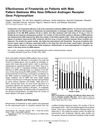 30 citations,
January 2014 in “Annals of Dermatology”
30 citations,
January 2014 in “Annals of Dermatology” Scalp dermatoscopy helps diagnose and monitor hair loss severity.
 4 citations,
January 2013 in “European Journal of Dermatology”
4 citations,
January 2013 in “European Journal of Dermatology” Epigenetic differences affect hair loss in identical Japanese male twins.
 43 citations,
January 2007 in “American Journal of Clinical Dermatology”
43 citations,
January 2007 in “American Journal of Clinical Dermatology” Combined minoxidil and tretinoin solution works as well as regular minoxidil for male hair loss.
 6 citations,
December 2018 in “International Journal of Cosmetic Science”
6 citations,
December 2018 in “International Journal of Cosmetic Science” Mexican women's hair is between Asian and Caucasian hair in thickness and shape, with varied strength and some damage.
 July 2012 in “Springer eBooks”
July 2012 in “Springer eBooks” The document concludes that proper diagnosis and treatment of nonscarring alopecias can improve quality of life and hair regrowth is possible as the hair follicle remains intact.
 5 citations,
December 2018 in “Journal of Cosmetic Dermatology”
5 citations,
December 2018 in “Journal of Cosmetic Dermatology” PRP treatment improves hair count, density, and reduces hair loss in AGA patients.
 5 citations,
November 2019 in “Dermatology and therapy”
5 citations,
November 2019 in “Dermatology and therapy” Beard hair extraction improves scalp hair restoration results in East Asian men with severe hair loss.
 5 citations,
March 1985 in “Head & Neck Surgery”
5 citations,
March 1985 in “Head & Neck Surgery” Combining scalp reduction and hair transplants improves coverage and appearance for male baldness.
 9 citations,
January 1997 in “Gynecological Endocrinology”
9 citations,
January 1997 in “Gynecological Endocrinology” The document concludes that treating androgen excess needs patience, managing expectations is important, and many drugs used are not officially approved, suggesting cosmetic options for mild cases.
 5 citations,
February 2013 in “Dermatology and therapy”
5 citations,
February 2013 in “Dermatology and therapy” Crescina® lotion helps reduce hair loss and increase hair growth in males with androgenetic alopecia.
 5 citations,
February 2024 in “Frontiers in bioengineering and biotechnology”
5 citations,
February 2024 in “Frontiers in bioengineering and biotechnology” Electrospun scaffolds can improve healing in diabetic wounds.
3 citations,
March 2020 in “Our Dermatology Online” Microneedling can improve hair growth in people not responding to standard treatments.

Oral minoxidil is as effective and safe as topical minoxidil for treating female pattern hair loss.
 September 2017 in “Springer eBooks”
September 2017 in “Springer eBooks” Epinephrine does not significantly affect the severity of hair loss after surgery.
 November 2023 in “Journal of Cosmetic Dermatology”
November 2023 in “Journal of Cosmetic Dermatology” Oral minoxidil is more convenient but topical minoxidil improves hair density better.
 18 citations,
May 2013 in “Annals of Dermatology”
18 citations,
May 2013 in “Annals of Dermatology” AGA increased yearly, type I most common, and family history and seborrheic dermatitis often linked.
10 citations,
July 2015 in “International Journal of Trichology”  June 2022 in “Journal of The European Academy of Dermatology and Venereology”
June 2022 in “Journal of The European Academy of Dermatology and Venereology” Microneedling with topical dutasteride improves hair growth in men with hair loss and is safe to use.

Hair transplants are effective for male and female pattern baldness, have evolved in technique, and require careful planning for natural results and managing complications.
1 citations,
September 2021 in “Nigerian journal of medicine : journal of the National Association of Resident Doctors of Nigeria” Androgenetic alopecia is common in South-West Nigeria, affecting more men than women, with stress worsening the condition.
 10 citations,
November 2010 in “Journal of Dermatology”
10 citations,
November 2010 in “Journal of Dermatology” Longer CAG repeats in gene linked to more severe hair loss in females.
 21 citations,
May 2017 in “International Journal of Dermatology”
21 citations,
May 2017 in “International Journal of Dermatology” Overweight smokers have worse hair loss.
 1 citations,
November 2009 in “Hair transplant forum international”
1 citations,
November 2009 in “Hair transplant forum international” Dr. Shoji Okuda's early hair transplantation techniques were rediscovered after being overlooked due to World War II.
November 2021 in “International Journal of Trichology” Trichoscopy is effective for diagnosing and monitoring female pattern hair loss.
 53 citations,
May 2010 in “PubMed”
53 citations,
May 2010 in “PubMed” Spironolactone helps regrow hair in women with hair loss.
10 citations,
January 2019 in “Indian Journal of Dermatology” Early-onset male hair loss is linked to metabolic syndrome, suggesting a need for heart health monitoring and lifestyle changes.
 23 citations,
December 2005 in “Journal of Investigative Dermatology Symposium Proceedings”
23 citations,
December 2005 in “Journal of Investigative Dermatology Symposium Proceedings” Finasteride works better for baldness in people with shorter gene repeats.
 126 citations,
January 2010 in “British Journal of Dermatology”
126 citations,
January 2010 in “British Journal of Dermatology” Baldness is more common in Chinese men than women, increasing with age, and is influenced by genetics.
 3 citations,
January 2019 in “Dermatology and therapy”
3 citations,
January 2019 in “Dermatology and therapy” Scalp massages may help stabilize or regrow hair in people suffering from hair loss, regardless of age, gender, or use of other treatments.
 11 citations,
September 2019 in “Dermatologic Surgery”
11 citations,
September 2019 in “Dermatologic Surgery” A substance called Vascular Endothelial Growth Factor can protect certain hair follicle stem cells from damage caused by androgens, suggesting a new possible treatment for hair loss.

























